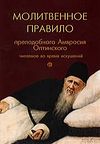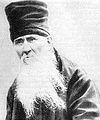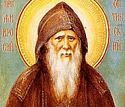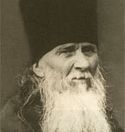

| Previous day | Next day |
| Old Style
October 10
|
Sunday |
New Style
October 23
|
| 19th Sunday after Pentecost. Tone 2. | No fast.
|
Commemoration of the Holy Fathers of the Seventh Ecumenical Council (787). ![]() Martyrs Eulampius and Eulampia and 200 martyrs with them, at Nicomedia (303-311).
Martyrs Eulampius and Eulampia and 200 martyrs with them, at Nicomedia (303-311). ![]() St. Ambrose, elder, of Optina Monastery (1891). St. Innocent, bishop of Penza (1819).
St. Ambrose, elder, of Optina Monastery (1891). St. Innocent, bishop of Penza (1819).
Martyr Theotecnus of Antioch (3rd-4th c.). St. Bassian of Constantinople (ca. 458). St. Theophilus the Confessor, of Bulgaria (716). Blessed Andrew of Totma (Vologda), fool-for-Christ (1673). New Hieromartyr Theodore (Pozdeyevsky), archbishop of Volokolamsk (1937).
Zographou Icon of the Most Holy Theotokos “Of the Akathist.”
St. Pinytus, bishop of Knossos on Crete (2nd c.). Martyrs of the Theban Legion, along the Rhine: Sts. Cassius and Florentius, at Bonn; Sts. Gereon and companions, at Cologne; and Sts. Victor and companions, at Xanten (Germany) (ca. 287). St. Paulinus, archbishop of York (644). Martyrdom by the Latins of the 26 Martyrs of Zographou Monastery on Mt. Athos: Abbot Thomas, Monks Barsanuphius, Cyril, Micah, Simon, Hilarion, Job, James, Cyprian, Sabbas, James, Martinian, Cosmas, Sergius, Paul, Menas, Ioasaph, Ioannicius, Anthony, Euthymius, Dometian, and Parthenius, and four laymen (1284). Sts. Stephen (1094) and Amphilochius (1122), bishops of Vladimir in Volhynia; St. Yaropolk-Peter, prince of Vladimir in Volhynia (1086); St. Theodore (in monasticism Theodosius) of the Kiev Caves, prince of Ostrog in Volhynia (1483); St. Juliana, princess of Olshansk (ca. 1540); St. Job, abbot and wonderworker of Pochaev (1651); and Hieromartyr Macarius of Kanev, archimandrite, of Obruch and Pinsk (1678). Synaxis of the Saints of Volhynia:
Repose of Schemamonk Theodore, desert-dweller of Valaam (1834).
Thoughts for Each Day of the Year
According to the Daily Church Readings from the Word of God
By St. Theophan the Recluse

Twentieth Sunday After Pentecost. [Gal. 1:11-19; Luke 7:11-16]
The Lord sees a mother weeping over the death of her son and has compassion on her; another time he was called to a marriage, and rejoiced together with the family. By this He showed that to share ordinary everyday joys and sorrows is not contrary to His spirit. This is what true, reverent Christians do, who live their life in fear [of God]. However, they distinguish some everyday life routines from others; for much has entered into these routines which cannot be God’s good will. There are customs that come from passions, which arise for their indulgence; others are kept alive by vanity and busyness. He who has the spirit of Christ, will be able to distinguish the good from the bad: he adheres to the one and rejects the other. He who does this with the fear of God is not alienated by others, though he does not act like them, because he always acts in the spirit of love and compassion toward the infirmities of his brothers. Only a spirit of zeal beyond measure rubs people the wrong way and produces disharmony and division. Such a spirit cannot refrain from teaching and criticizing. But the [one with the spirit of Christ] is only concerned with ordering his and his family’s life in a Christian way; he does not permit himself to interfere in the affairs of others, saying to himself, “Who set me as a judge?” He quietly makes everyone well disposed to himself, and inspires respect for those routines to which he holds. A supervisor makes himself unloved, and evokes disapproval for the good routines to which he holds. Humility in such cases is needed—Christian humility. It is the source of Christian good sense, which knows how to act well in a given situation.
Articles
 Martyrs Eulampius and Eulampia and 200 martyrs with them, at NicomediaSaints Eulampius and Eulampia were brother and sister. |
 Martyr Theotecnus of AntiochSaint Theotecnus of Antioch was a renowned military commander at Antioch under the emperor Maximian (305-311). |
 Saint Bassian of ConstantinopleThe venerable Bassian was the igumen at a monastery where there were three hundred monks. |
 St. Theophilus the Confessor of BulgariaSaint Theophilus the Confessor of Bulgaria came from the area surrounding Tiberiada. |
 Blessed Andrew of Totma the Fool-For-ChristBlessed Andrew of Totma, the Fool-for-Christ was born in the year 1638 in the village of Ust-Totma and chose to leave the world while still a child. |
 The Akathist—Zographou Icon of the Mother of GodThe Icon from which the elder had heard a voice was with the martyrs, and was later found, lying entirely unharmed, underneath the ashes. |
 Synaxis of the Saints of VolhyniaOn this day, we commemorate the Synaxis of Saints of Volhynia—one of the most ancient domains of Christian Rus’, and now part of western Ukraine. |

















